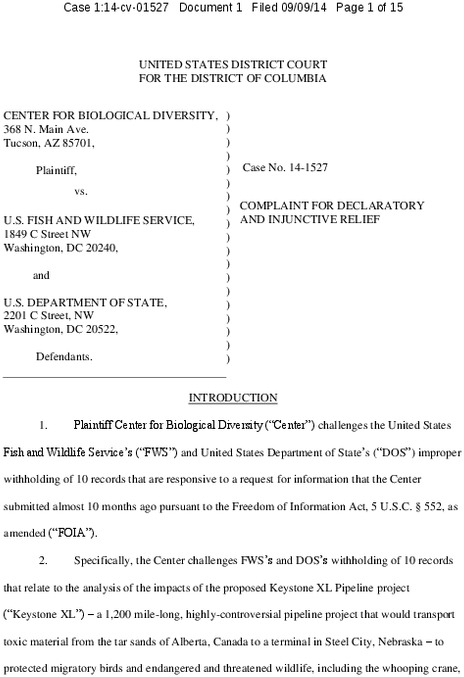From the Open-Publishing Calendar
From the Open-Publishing Newswire
Indybay Feature
Lawsuit Seeks Public Records on Keystone XL's Impacts on Endangered Species
WASHINGTON— The Center for Biological Diversity filed a lawsuit (see PDF) on September 9 against the U.S. Fish and Wildlife Service and the State Department to obtain public records that reveal how the proposed Keystone XL pipeline project will affect migratory birds and endangered species, including whooping cranes. Nearly 10 months ago the Center filed a Freedom of Information Act request for Keystone’s “migratory bird conservation plan” and survey data specifically referenced in the agency’s environmental analysis. Although the analysis has been made public, the agencies have refused to release the documents that underpin the review.
The records that the Center requested would reveal to the public — for the first time — the specific areas where the pipeline could result in severe impacts to some of North America’s most imperiled wildlife.
“It’s revealing that the agencies are doing their best to withhold critical information from the public on Keystone XL’s potential impacts to endangered species,” said Jared Margolis, an attorney for the Center who focuses on the impacts of energy development on endangered species. “There’s every reason to believe Keystone XL will have disastrous impacts on whooping cranes, piping plovers and other protected species. You can only assume that’s why they’re withholding these key documents — to prevent us from fully assessing these impacts, or the agency’s claims to the contrary.”
Keystone XL, a 1,200 mile-long, highly controversial pipeline project that would transport tar sands oil from Alberta, Canada to a terminal in Steel City, Neb., would include hundreds of miles of new power lines that will present dozens of new collision hazards for cranes as well as perches for birds that prey on endangered interior least terns and piping plovers.
“The public has a right to know the toll Keystone XL will have on endangered species,” said Margolis. “The government should stop playing games and provide this information immediately.”
An analysis by the Center last year found that at least 12 threatened and endangered species in four states will be put in harm’s way by Keystone, including whooping cranes, interior least terns, American burying beetles, northern swift fox, greater sage grouse, piping plovers, pallid sturgeons and black-footed ferrets. Threats include habitat destruction, bird deaths from power line collisions and oil spills.
The Center for Biological Diversity is a national, nonprofit conservation organization with more than 775,000 members and online activists dedicated to the protection of endangered species and wild places.
http://www.biologicaldiversity.org/news/press_releases/2014/keystone-xl-09-09-2014.html
“It’s revealing that the agencies are doing their best to withhold critical information from the public on Keystone XL’s potential impacts to endangered species,” said Jared Margolis, an attorney for the Center who focuses on the impacts of energy development on endangered species. “There’s every reason to believe Keystone XL will have disastrous impacts on whooping cranes, piping plovers and other protected species. You can only assume that’s why they’re withholding these key documents — to prevent us from fully assessing these impacts, or the agency’s claims to the contrary.”
Keystone XL, a 1,200 mile-long, highly controversial pipeline project that would transport tar sands oil from Alberta, Canada to a terminal in Steel City, Neb., would include hundreds of miles of new power lines that will present dozens of new collision hazards for cranes as well as perches for birds that prey on endangered interior least terns and piping plovers.
“The public has a right to know the toll Keystone XL will have on endangered species,” said Margolis. “The government should stop playing games and provide this information immediately.”
An analysis by the Center last year found that at least 12 threatened and endangered species in four states will be put in harm’s way by Keystone, including whooping cranes, interior least terns, American burying beetles, northern swift fox, greater sage grouse, piping plovers, pallid sturgeons and black-footed ferrets. Threats include habitat destruction, bird deaths from power line collisions and oil spills.
The Center for Biological Diversity is a national, nonprofit conservation organization with more than 775,000 members and online activists dedicated to the protection of endangered species and wild places.
http://www.biologicaldiversity.org/news/press_releases/2014/keystone-xl-09-09-2014.html
Add Your Comments
We are 100% volunteer and depend on your participation to sustain our efforts!
Get Involved
If you'd like to help with maintaining or developing the website, contact us.
Publish
Publish your stories and upcoming events on Indybay.
Topics
More
Search Indybay's Archives
Advanced Search
►
▼
IMC Network



